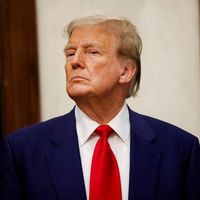Iranian politicians, media say talks depend on Trump’s tone
Some Iranian politicians and media are attempting to soften Iran’s stance on negotiations with the United States after Supreme Leader Ali Khamenei’s rejection of talks, framing it as a call for President Donald Trump to change his public tone.
Meanwhile, several politicians and commentators have maintained a defiant stance, while others, including President Pezeshkian, have remained in denial about the talks, insisting they can address Iran's problems without the need to lift sanctions.
For the second time in less than a week, Jomhouri Eslami—a daily linked to Khamenei's office but often critical of hardline policies—argued in a February 15 article that negotiations between Tehran and Washington remain possible if Trump moderates his tone toward the Islamic Republic.
The daily accused Trump of "naivety," stating, "The responses he received from Iranian officials should have shown him that arrogant rhetoric does not work with Iran." It also addressed Trump directly, asserting, "Iran is not opposed to negotiations—it is opposed to blackmail."
Meanwhile, former Justice Minister and security official Mostafa Pourmohammadi told Entekhab news website on February 15 that "Khamenei has never forbade negotiations with the United States." However, this statement was in a clear and sharp contrast with Khamenei's latest remarks.
Pourmohammadi commented, "Khamenei has never closed the door to negotiations. On the contrary, it is US officials who want to portray Iran as unwilling to negotiate. In reality, we are a rational state with a strong foundation and an educated nation always ready for dialogue with the world."
Elsewhere in the interview, he contradicted himself, saying, "We would never negotiate with arrogant individuals who first slap us in the face and then say, 'Let's kiss and talk.'" His remarks closely echoed Pezeshkian’s February 10 speech on the anniversary of the 1979 revolution, where he dismissed negotiations with Trump and called his behavior "unmanly."
The conservative Nameh News website quoted ultraconservative commentator Foad Izadi, frequently presented by Iranian state TV as a US politics expert, as saying, "Trump will attack Iran if he believes the cost will be low or manageable. However, if he sees that such an attack would come at a high price, he will never go through with it."
Nameh News described Tehran and Washington as being at a historic turning point in their relations. The outlet noted that Pezeshkian had hoped to engage in talks with Trump under the conditions set by his administration in 2018. However, Trump’s latest stance—implying that Iran could avoid Israeli airstrikes if it agreed to negotiate—has left Tehran in a state of uncertainty.
The Iranian Labor News Agency (ILNA) quoted Iran's security chief, Ali Ahmadian, as saying that Iran has no ideological opposition to negotiating with the United States. However, he asserted that Tehran refuses to engage with Washington due to its "arrogant behavior" before and during the 2015 nuclear negotiations, as well as its failure to uphold commitments after the deal was reached.
Meanwhile, some Iranian politicians and commentators, including conservative figure Nasser Imani, have advocated strengthening ties with China and Russia instead of engaging with the United States. The Rouydad24 website quoted Imani as saying, "There is no point in making a deal with America. We have to pivot toward China and Russia."
At the same time, Ahmad Bakhshayesh Ardestani, a member of the parliament's national security committee, addressed US concerns over Iran’s potential nuclear weaponization. In what appeared to be support for developing nuclear weapons, he stated, "Whether we have a bomb or not, US sanctions will continue." However, echoing moderate politicians and media, Ardestani added, "We will negotiate with America if Trump adopts a softer tone and rhetoric."







